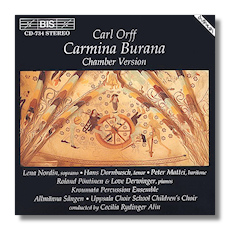
The Internet's Premier Classical Music Source
Related Links
- Orff Reviews
- Latest Reviews
- More Reviews
-
By Composer
-
Collections
DVD & Blu-ray
Books
Concert Reviews
Articles/Interviews
Software
Audio
Search Amazon
Recommended Links
Site News
 CD Review
CD Review
Carl Orff

Carmina Burana
Lena Nordin, soprano
Hans Dornbusch, tenor
Peter Mattei, baritone
Roland Pöntinen & Love Derwinger, pianos
Kroumata Percussion Ensemble
Allmänna Sången, Uppsala Choir School Children's Choir/Cecilia Rydinger Alin
BIS-CD-734 61:17
Summary for the Busy Executive: Still packs a punch.
Despite the efforts of the Lovers of True Beauty to kill it off, Orff's Carmina Burana refuses to die, either in recording or on the concert stage. There are dozens of recordings out there, most of which are unsatisfactory to some degree or another. Ormandy's account (the first one I had ever heard and which bound me to the piece with hoops of steel) featured my favorite baritone soloist in the work, Harve Presnell (who later played the domineering father-in-law in the Coen brothers' Fargo), but the ensemble work was a bit slack and the other soloists nothing much.
For me, a great Carmina means first and foremost a great chorus. For that reason, I love Frühbeck de Burgos on EMI with the New Philharmonia Chorus, trained by the legendary Wilhelm Pitz, and a pretty good quartet of soloists: John Noble, Raymond Wolansky, Gerhard Unger, and Lucia Popp. I can't figure out why a quartet rather than a trio, since Noble and Wolansky both sing baritone, but it's not that worrisome to the performance. Then there's Michael Tilson Thomas's exciting account on Sony directing the Cleveland Orchestra and Chorus (trained by Robert Page) and a great trio, with the young Judith Blegen as the standout. Probably the Jochum recording with the Bavarian Radio Symphony and Chorus comes closest to the composer's intent, but no one moment particularly grabs you.
So, in the great scheme of things, where do the Swedes fit in? First, this is not the full-blown Carmina Burana, but a chamber version. The composer has reduced the orchestra to two pianos and percussion. I haven't been able to find out whether Orff composed this version first and then expanded it or gleaned this version from the full orchestra to encourage amateur performances or to bring it in line with the instrumentation of the other two parts of Trionfi, Catulli Carmina and Trionfo di Afrodite. In the mighty fortissimos, you don't, oddly enough, miss the orchestra, but you do (or at least I did) miss the strings and the winds in the quieter passages. However, the connections to Stravinsky's Les Noces become much clearer with the similar instrumentation. In essence, Orff's career owes almost everything to that earlier score. This leaner version gets you closer to chorus and soloists and fosters nuance, not always all that apparent in Orff.
The chorus here stands out – rhythmically sharp. Orff wrote the score with a workers' chorus in mind. Harmonies and rhythms aren't all that tricky. The real work of the chorus consists of spitting out the text. The declamation of the text, the clear enunciation of consonants (as in "Si puer cum puellula" or "In taberna"), become elements enhancing the percussive qualities of the piece. Incidentally, the text isn't provided, due to copyright insanity, but you don't really need it. The choir declaims with great energy and clarity.
The soloists are a mixed bag. All of them perform with the subtlety of Lieder singers. Soprano Lena Nordin has the light, lyric voice called for by the texts, but she's often a few cents flat. Peter Mattei, baritone, lacks the vocal weight for the music, although he sings very well. The best of the three is tenor Hans Dornbusch as the roasted swan. Unusually, he sings the cruelly high part full out and with a harsh tone, without resorting to falsetto, which emphasizes the pain of the bird as he rotates on the spit. Once you hear Dornbusch, you realize what you've missed in Nordin and Mattei – a dramatic sensibility. All the refinement of those two means less in this work than raw energy.
Roland Pöntinen and Love Derwinger, the two pianists, play fussily, setting forth an Interpretation, as if this were Brahms rather than Orff. Whether they came up with these ideas on their own or whether conductor Alin commanded them, I don't know. Some of these things come off. Others remind me of William F. Buckley at a Motorcross rally.
All in all, this shouldn't be your only Carmina. However, it's just interesting and good enough to merit a place on your shelves.
Copyright © 2008, Steve Schwartz.




















